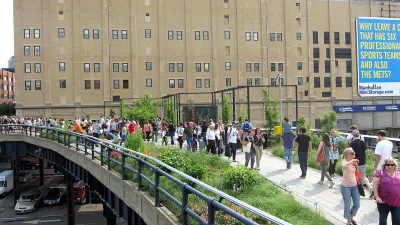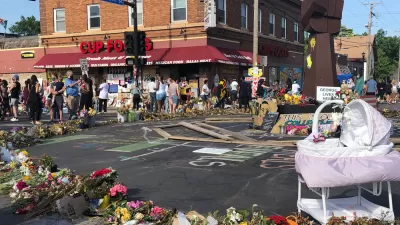A Fast Co. Design article explains the "just green enough" concept as advanced by Jennifer Wolch, dean of the College of Environmental Design at the University of California, Berkeley.
"On the three Es of sustainability--ecology, economy, and equity--the High Line in New York passes the first two with flying colors," writes Eric Jaffe. "But the High Line's record on equity is more troubling."
"The High Line is an extraordinary example of what's become an ordinary theme for green design projects: a dazzling park comes in, the low-income locals go out."
Jaffe's critique of the High Line comes by way of an introduction to the concept of "just green enough" (defined by Jaffe as "a delicate balance of sustainability and equity"), as researched by Jennifer Wolch, dean of the College of Environmental Design at University of California, Berkeley.
Jaffe presents "just green enough" as a tool to overcome the challenges posed by the High Line: "The basic idea is that not every sustainable design project need be a market-driven concept that favors new residents to native populations. Instead of a grand waterfront plaza dotted with high-end boutiques and LEED-certified towers, a 'just green enough' strategy might emphasize small-scale community gardens or basic environmental cleanup."
Jaffe goes on to sight real world examples of the "just green enough" concept in action, most notably in Greenpoint, Brooklyn.
FULL STORY: How Parks Gentrify Neighborhoods, And How To Stop It

Planetizen Federal Action Tracker
A weekly monitor of how Trump’s orders and actions are impacting planners and planning in America.

Maui's Vacation Rental Debate Turns Ugly
Verbal attacks, misinformation campaigns and fistfights plague a high-stakes debate to convert thousands of vacation rentals into long-term housing.

Restaurant Patios Were a Pandemic Win — Why Were They so Hard to Keep?
Social distancing requirements and changes in travel patterns prompted cities to pilot new uses for street and sidewalk space. Then it got complicated.

In California Battle of Housing vs. Environment, Housing Just Won
A new state law significantly limits the power of CEQA, an environmental review law that served as a powerful tool for blocking new development.

Boulder Eliminates Parking Minimums Citywide
Officials estimate the cost of building a single underground parking space at up to $100,000.

Orange County, Florida Adopts Largest US “Sprawl Repair” Code
The ‘Orange Code’ seeks to rectify decades of sprawl-inducing, car-oriented development.
Urban Design for Planners 1: Software Tools
This six-course series explores essential urban design concepts using open source software and equips planners with the tools they need to participate fully in the urban design process.
Planning for Universal Design
Learn the tools for implementing Universal Design in planning regulations.
Heyer Gruel & Associates PA
JM Goldson LLC
Custer County Colorado
City of Camden Redevelopment Agency
City of Astoria
Transportation Research & Education Center (TREC) at Portland State University
Jefferson Parish Government
Camden Redevelopment Agency
City of Claremont





























